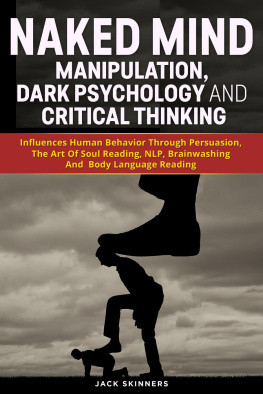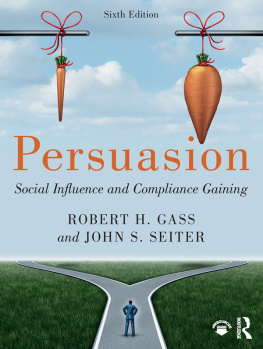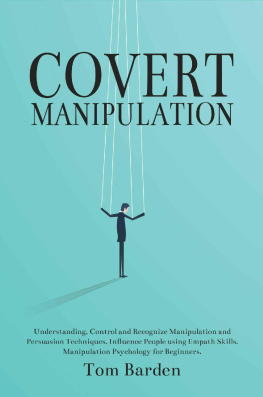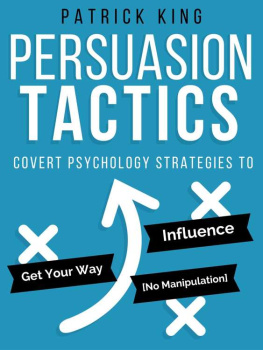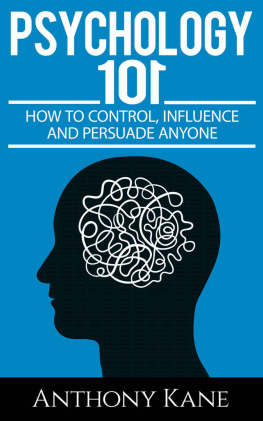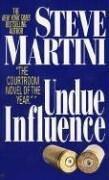opening minds:
the secret world of manipulation, undue influence and brainwashing
copyright 2015 Trentvalley ltd, Colchester, England
cover design by Spike Robinson
ISBN: 978-0-9971096-0-3
this book is dedicated to the memory of Bobby Yang who was a daily source of good cheer throughout his short life
praise for Jon Atacks previous work:
This incredible book made me want to track down the author, Jon Atack, in person and so I did, and interviewed him for my latest documentary project. His incredible breadth and knowledge of religions and belief systems turned my three-hour interrogation into one of the most fascinating discussions Ive ever had. I recommend you find Jon Atack and buy him a drink and get him talking, but in the meantime, start with this book. Roger Nygard, Director, The Nature of Existence Throughout my professional life, I have seen so many victims of poisonous ideologies from communism and scientology to Saddam Husseins return to faith and Al Qaedas martyrdom. In my attempts to help those sufferers, I applied a lesson learned from Jon Atacks writings that freedom cannot be delivered, granted, or enforced. The true and complete freedom comes only with the freedom of mind and Jon Atacks book is the best guide for all who want to achieve that freedom. Professor Khapta Akhmedova, expert on terrorism I appreciate the staggering amount of research material that Mr. Atack had to assimilate and present. He demonstrated impeccable judgment concerning his sources, and similarly he showed artistic skill in his ability to present complex material in graceful and clear prose. Had his book been offered by a doctoral candidate it would far exceed necessary standards an unrivalled piece of superb scholarship. Quickly his book has become one of the classic studies of sectarianism and deviant belief systems. All future scholarship on Scientology will build upon his contribution. Professor Stephen Kent, Head of Sociology and History of Religion, University of Alberta Nobody explains more clearly how a normal, rational person can succumb to the power of group thought and control. Luckily, Jon Atack also explains how to spot undue influence and escape from its clutches, wherever it may come from. Jill Robinson, producer & director, The Secret Life of L. Ron Hubbard
Contents
introduction
1 you are not a gentleman: the principles of influence
a brush with a telephone scammer ~ the basic methods of confidence tricksters, cult recruiters, and other manipulators ~ examples from history ~ cialdinis influence model
2 recruitment: the way to unhappiness
the processes of recruitment ~ the typical path of entrapment ~ the hard sell technique ~ how reinforcement maintains membership ~ hallmarks of a manipulative group
3 manufacturing fanatics
the behavioural models of lifton, singer, festinger and hassan ~ the tragic results of applied manipulation ~ the insights of a survivor of radicalisation ~ the participatory dynamics of extremism
4 groupthink
mass sociogenic illness ~ the natural basis for compliance ~ the robbers cave experiment ~ milgrams obedience study ~ the stanford prison experiment ~ the ingredients of groupthink ~ ideas to die for
5 the minds I: consciousness and identity
the nature of individuality and its biological roots ~ group dynamics ~ the democracy of bees ~ the inner alligator
6 the imitation game: from mimicry to hypnosis
the mechanics of hypnosis ~ cognitive dissonance in more depth ~ selective perception and filling in ~ convictions without conscious thought ~ the neurophysiology of prejudice
7 life is a pitch (and then you buy)
the expansion of undue influence through innovations in communication ~ advertising and propaganda as methods of influence ~ government mind control programmes
8 undue influence: the science and the law
how presumed authority enabled sexual assault via telephone ~ the strange case of Mrs Death ~ Derren Browns demonstrations of manipulation ~ undue influence and genocide ~ radicalisation as totalism
9 the way forward
the necessity of education in the principles of undue influence ~ the influence of the arts ~ honest persuasion versus coercion ~ how to talk with a fanatic
10 from groupthink to followership: bringing the living back to life
critical thinking, meditation and self-care ~ intelligent disobedience and courageous followership ~ a non-authoritarian model of education ~ whistle-blowers, pluralism and tolerance
afterword: the open minds foundation
introduction
When you believe in things that you dont understand, then you suffer.
Stevie Wonder, Superstition .
We live in an age where unethical persuasion is applied every day, all day, to subvert reasoning through direct appeals to ones emotions. Throughout history, people have been unwittingly influenced to act against their own better interests. But today, more sophisticated forms of influence have been devised, posing a significant threat to a free and open society. It is persuasion so sinister and subtle that it can derail critical thinking and overwhelm even the most intelligent of people, reducing them into unthinking compliance.
Manipulation, undue influence and brainwashing, or whatever one chooses to call such exploitive persuasion, challenges the very notion of human rights. The use of it by unscrupulous cults, totalitarian groups and abusive individuals is growing at an alarming rate. Yet, undue influence remains a well-kept secret in the media and for the general public. This book will show how the human mind is cajoled into submitting to unethical, uninvited external influence.
Nine years inside Scientology left me wondering how I had been so completely taken in by its bizarre belief system. After exiting and spending a dozen years helping former cult members, I gradually came to understand the intricate dynamics of undue influence and tactics of the manipulators.
Undue influence is rife in our society. It is used by terrorists to radicalise young Muslims; by paedophiles to groom innocent youngsters; by white supremacists and criminal gangs to lock in new recruits; by human traffickers to keep their workers enslaved; and to persuade millions of members of pseudo-religious groups to violate the basic human rights of even close family members.
Only by understanding the principles of undue influence can our society be made resistant to extremism. These principles are grounded firmly in scientific research, yet the writing of this book is the first time the components of this covert approach have been brought together in a single, accessible volume.
This work challenges the belief of some social scientists that we are the product of our environment, compelled by forces that we can neither control nor fully comprehend. While research demonstrates that people all too often act almost as a herd, there are ways to develop resistance to group influence and to increase both rationality and responsibility to the benefit of society.
We must offer some preventative medicine, because cult-like thinking is powerfully on the increase in our world. Hundreds of millions of people have given their allegiance to fanatical groups and even democratic governments at times use undue influence on the electorate. Only by exposing the tricks of undue influence can we slow down this pervasive expansion of mind-control techniques and create a far safer world.
Over 30 years ago, when I left Scientology, it became apparent to me that cults are a microcosm of the larger society, where powerful social forces are played out. According to eminent psychologist Margaret Singer, cults are not at the fringe but at the very heart of our society. My investigation into the secret world of manipulation, undue influence and brainwashing has included every type of group from the interpersonal to the international. It has followed all of the branches of propaganda from product advertising to political spin-doctoring and outright lies, and many other methods of influence from hypnosis and psychotherapy to mass indoctrination.
Next page


